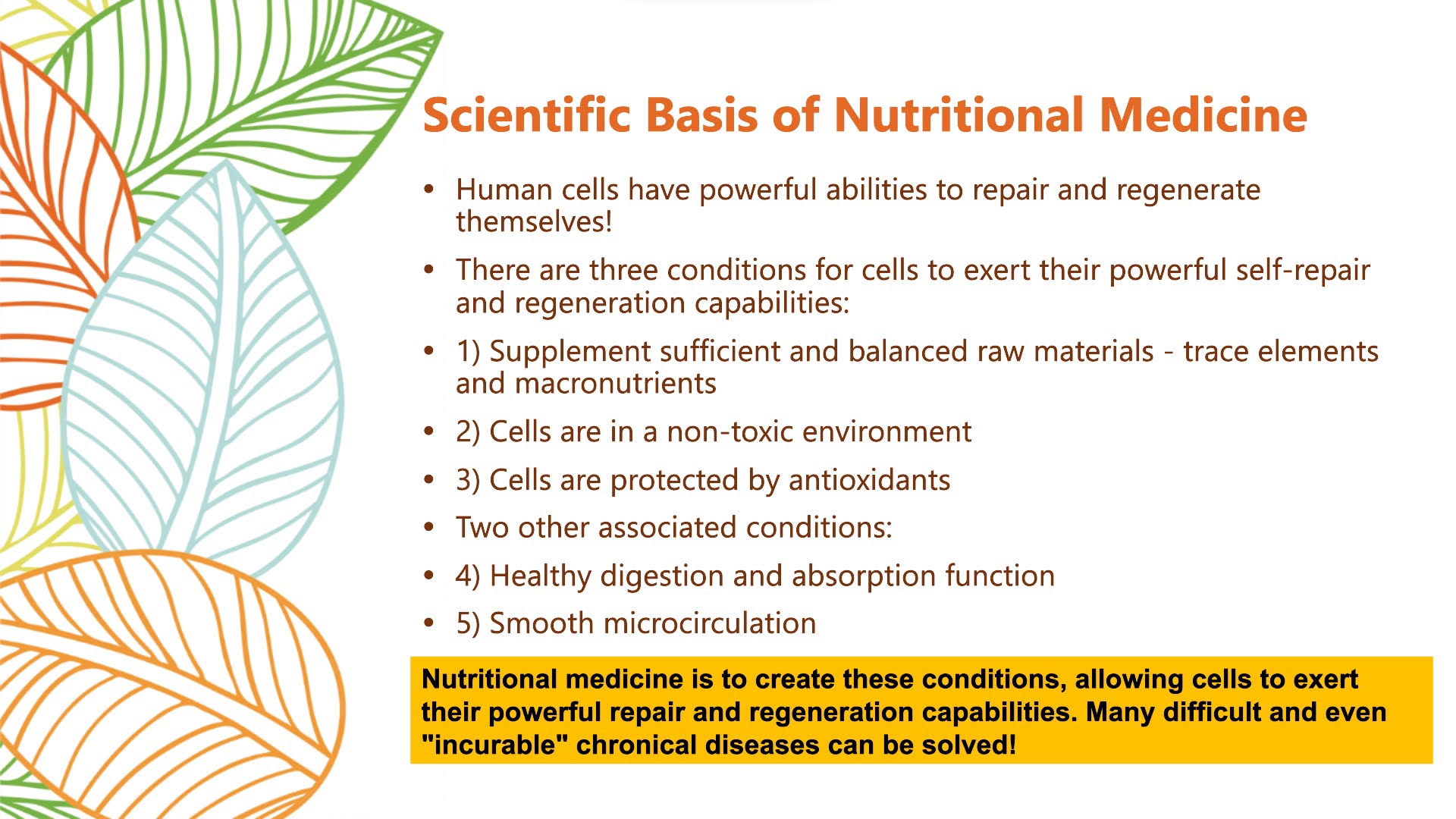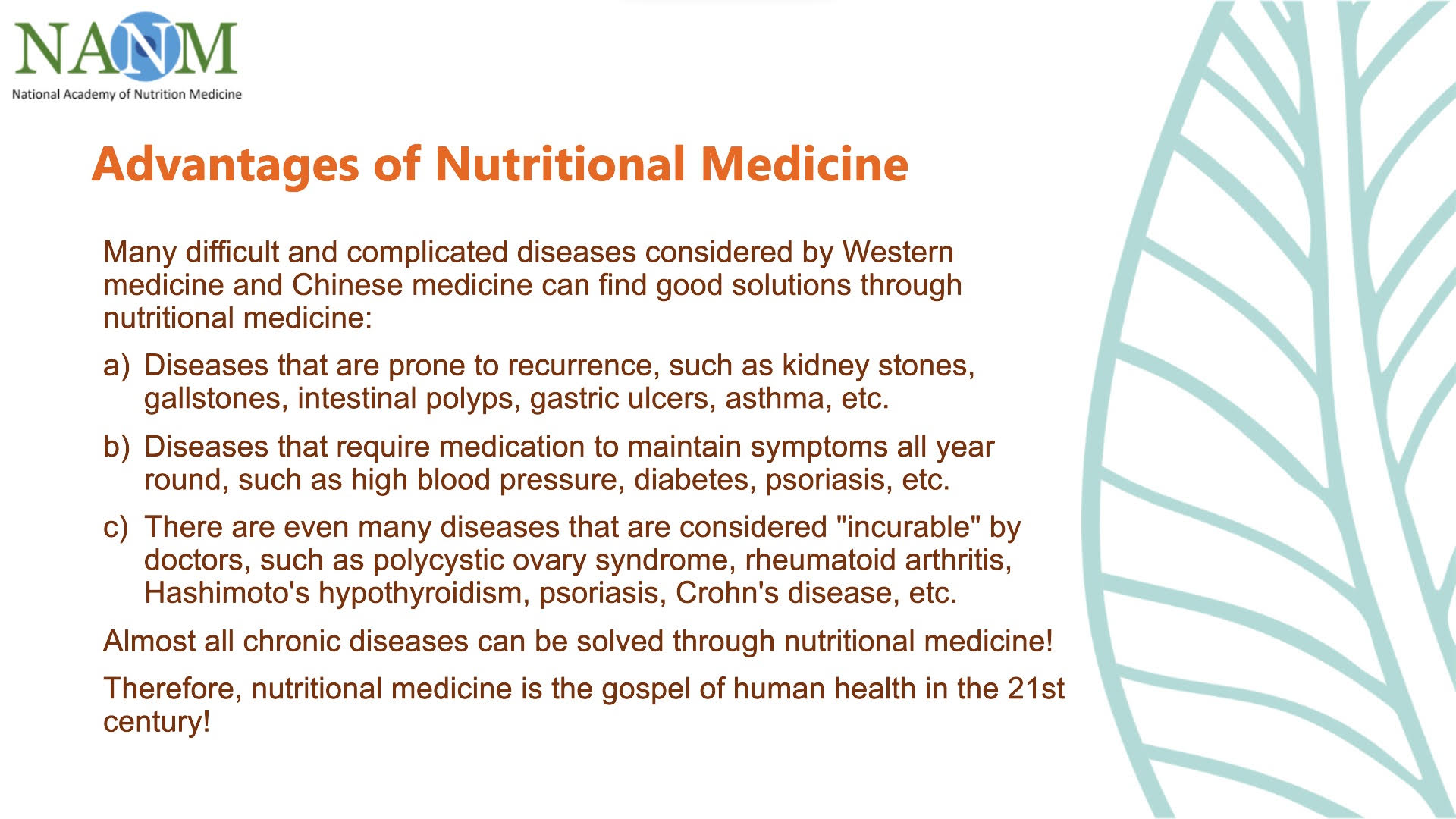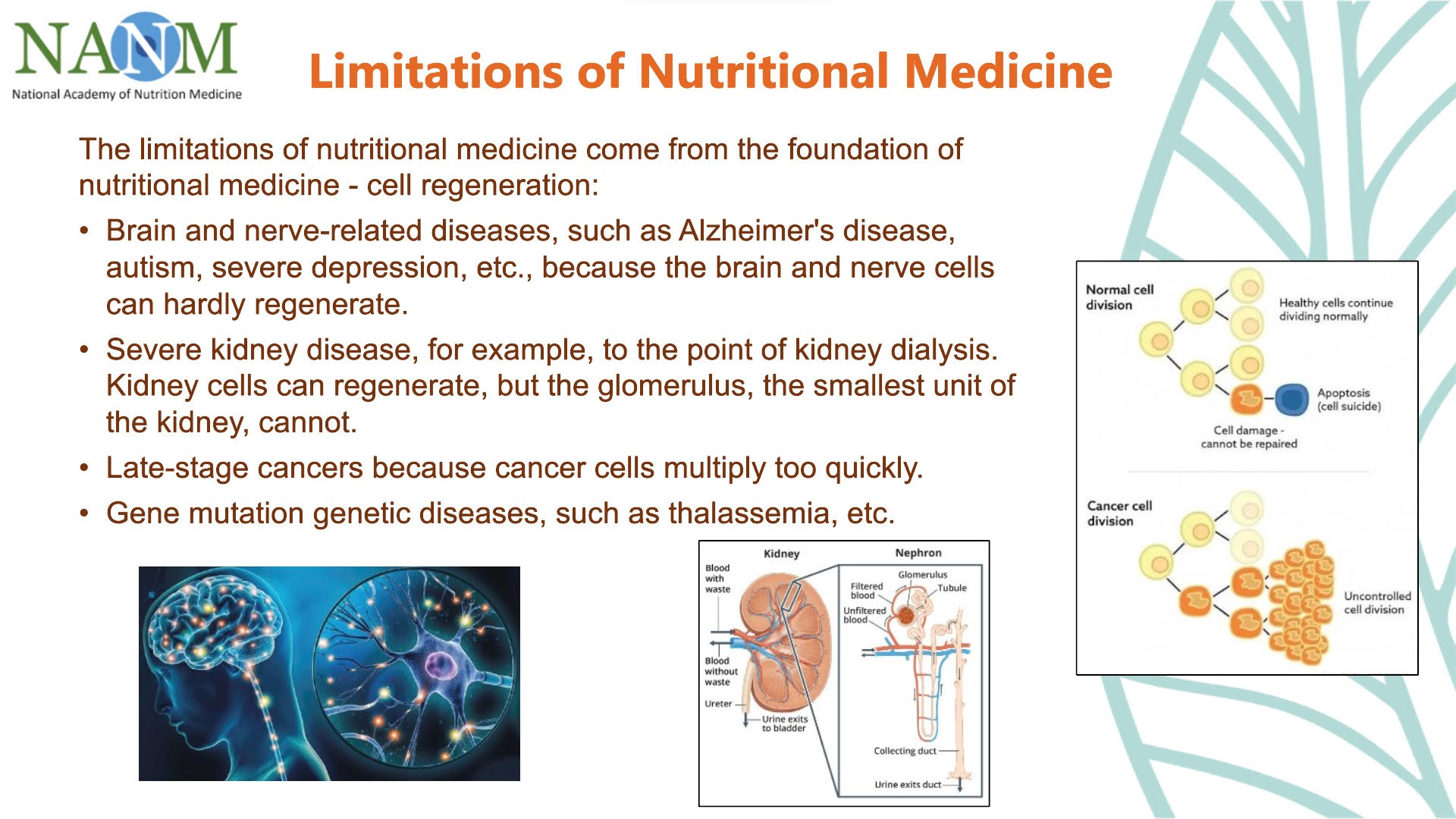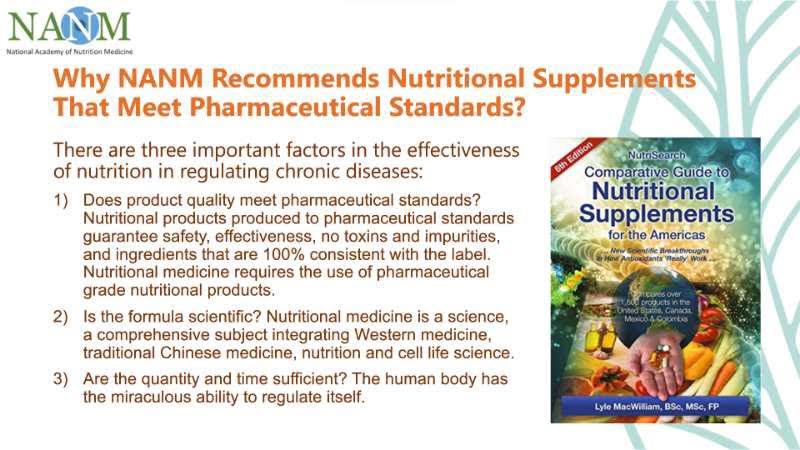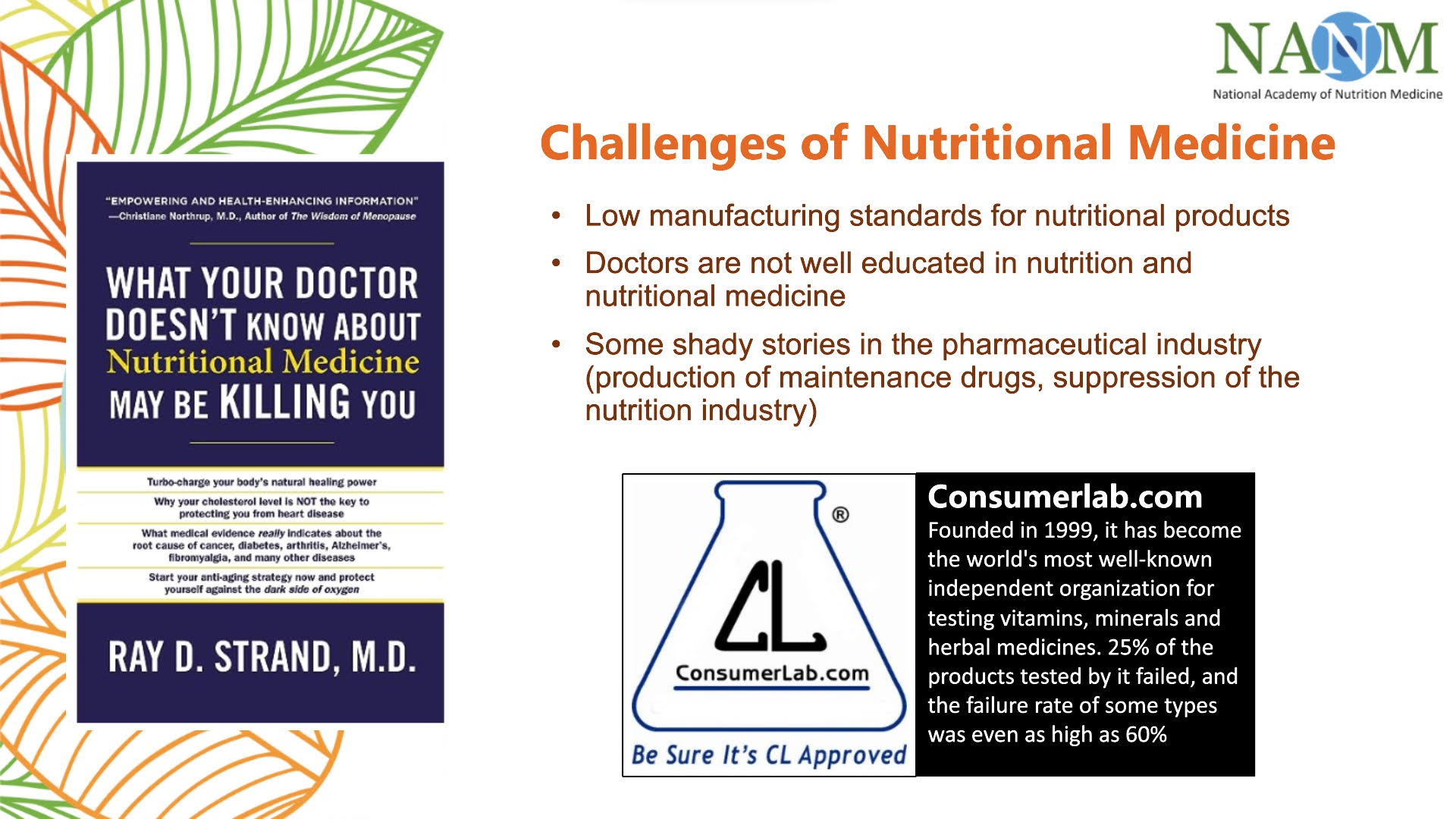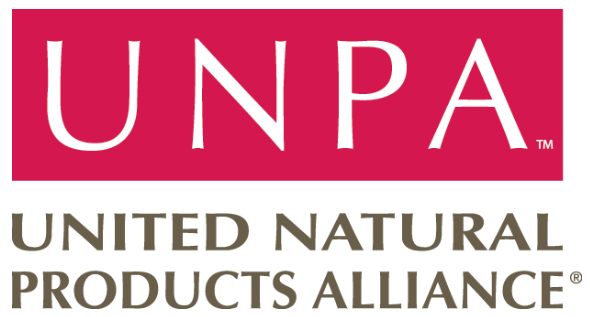National Academy of Nutrition Medicine
Nutritional medicine is an emerging comprehensive discipline integrating nutrition, Western medicine, traditional Chinese medicine, and cellular life sciences.
We believe that nutritional medicine is the health gospel for mankind in the 21st century!
Watch Video
Nutritional Medicine
Nutritional Medicine
About Us
About Us
We are pioneers, promoters, advocates, and educators of nutritional medicine. We believe that nutritional medicine is the health gospel for mankind in the 21st century!
Promoting Nutritional Medical Knowledge
As a platform, we aim to deliver the latest nutritional science research and recommendations to the public and other health professionals. By disseminating cutting-edge findings and practical advice, we strive to enhance the well-being and health literacy of communities globally.
Upholding Industry Standards
Our association is committed to establishing and promoting best practices, ethical guidelines, and standards in the field of nutritional medicine. We are devoted to ensuring professionalism and integrity to serve the best interests of the public and professionals alike.
Providing Education and Training
We organize lectures, seminars, and courses aimed at enhancing the nutritional knowledge and skills of our members and the general public. Through education, we empower individuals to make informed decisions for their health and well-being.
Hosting Public Health Lectures
Through our charitable health and nutrition lectures, we communicate accurate nutritional concepts to communities, schools, and corporations. Our goal is to make knowledge accessible, fostering a healthier and informed society.
Offering Public Health Services
In collaboration with governments and organizations, we offer nutritional assessments, supplements, and counseling services to specific communities or underserved populations, ensuring that quality health resources are available to all.
Promoting Interdisciplinary Cooperation
Our association serves as a hub for experts in nutrition, medicine, pharmacy, and public health, fostering an environment of exchange and collaboration that drives innovation and enhanced health outcomes.
Policy Recommendations and Advocacy
We offer policy recommendations concerning nutrition and health, advocating for the refinement of laws and regulations to foster a healthier society.
Supporting and Funding Research
Our association allocates funds and resources to support foundational and clinical research in nutritional medicine, driving advancements in the field to benefit all of society.
Offering Accredited Nutritional Medicine Courses
We provide formal, authoritative certification courses for individuals aiming to build careers in the field of nutritional medicine, ensuring a workforce that is skilled, competent, and ethical.
Establishing Industry Partnerships
By building collaborations with the food industry, medical institutions, and academia, we ensure that nutritional advice and products are scientific, adaptive, and beneficial to the public.
Publishing Books and Magazines
We curate, edit, and publish books, manuals, magazines, and other materials related to nutritional medicine, offering our members and the public access to professional and updated knowledge and information.
Organizing Book Fairs and Seminars
We host book fairs, seminars, and workshops to showcase and promote books and publications related to nutritional medicine. These events provide a platform for authors, researchers, and readers to engage, exchange ideas, and foster a community of learning and innovation.
Certification
Certification: certified advisor of nutritional therapy
Certificate Sample
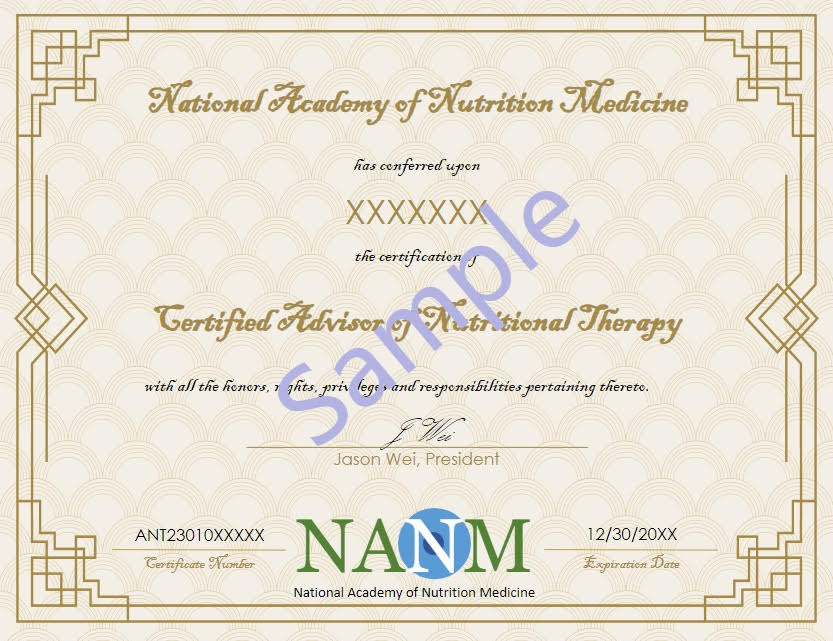
Our Choices
Our Choices
Third-party Authority Inquiry
Events
Events
| Date | Topic (Click to watch) |
|---|---|
| 10/02/2023 | nutrition and medicion |
| 09/10/2023 | nutrition introduction |
Our Team
Our Team

Jason Wei
President
Certified Nutrition Coach, USA
Certfied Advisor of Nutritional Therapy, USA
Successful Entrepreneurship Mentor in the Nutrition Industry
Double bachelor's and master's degree from Peking University, China
Ph.D. in Materials Science from UCSB, USA

Yinfei Zhang
Secretary General
Certified Nutrition Coach,USA
Specially invited lecturer from North America’s top nutrition company

Lu Hong
Vice President
Clinician in a tertiary hospital in China (33 years)
China National Nutritionist
China National Body Language Groomer

Wan Xiaoyun
Vice President
PhD in Educational Psychology from Japan
Bachelor of Medicine from China
Served as a physician in a tertiary hospital in China
Psychological counselor at an University in China

Libin Shi
Vice President
Graduated from School of Medicine at Tongji University, China
Former physician at a hospital in China
Has done medical research in School of Medicine at Yale University and Washington Children's Hospital, USA

Yang Wang
Vice President
Former Chief Physician of Clinical Nutrition in a tertiary hospital in China, with more than 30 years of experience in clinical nutrition
Master of Clinical Nutrition
Master of Social Medicine
Master of Health Economics
Member of the Anti-Aging Professional Committee of the Chinese Medical Association
Founder of the "Yizhishan Nutrition" sub-health nutrition improvement and disease nutrition intervention project

Grace Niu
Vice President
American Certified Nutritionist
High-rank leader of a public nutrition company in USA
Advisor

Fangyuan Vanzee
Advisor
U.S. Pharmacist
Doctor of Pharmacy, University of Calabria, Italy
Master of Child Educational Psychology, Institute of Psychology, Chinese Academy of Sciences

Rose Xu
Advisor
Working for a large American pharmaceutical company to analyze the effectiveness of drugs
Graduated from School of Public Health at UIC, USA

Shuo Yang
Advisor
Research Assistant Professor of Medicine at Northwestern University, USA
Undergraduate/ Master's degree from Nankai University, China
Master's/Ph.D from TEMPLE UNIVETSITY, USA

Linda Liu
Advisor
Ph.D. of Nutrition, USA
Master of Public Health, USA
Former gastroenterologist at a hospital in Beijing, China
Contact Us
Contact Us
WeChat:
gr76026
Email:
office@na-nm.org
Call:
+1 (317) 712-6160
F.A.Q.
F.A.Q.
-
What is true health?
In many discussions on health and medicine, people typically consider the following four key factors to maintain or promote health:
1、Balanced Diet: Consuming a variety of nutrients, such as proteins, carbohydrates, fats, vitamins, and minerals, to meet the body's needs and maintain health.
2、Regular Exercise: Engaging in regular physical activity can help enhance cardiovascular health, strengthen bones, boost metabolism, and also benefit mental health.
3、Adequate Sleep: Good sleep is crucial for recovery, memory, cognitive function, and emotional well-being.
4、Mental Health: Managing stress, maintaining a positive mindset, establishing and sustaining good relationships with others, and other psychological and emotional health practices are equally important for overall health.
To achieve optimal health, one needs to take into account a multitude of factors.
-
What are the underlying causes of human illnesses?
The etiology of diseases includes external and internal factors. External factors refer to various detrimental external influences that affect human health. These include infections from bacteria, viruses, and other pathogenic microorganisms, poor dietary habits and lifestyles, excessive mental and physical stress, environmental pollution, physical factors like ionizing radiation, and exposure to various chemical toxins such as pesticides. Internal factors refer to detrimental influences within the body that affect health, including genetic defects and weakened immunity.
Most diseases arise when the aforementioned external factors disrupt the stability of the internal environment. These damaging external agents primarily enter the body through the respiratory system, digestive tract, and skin. They result in excessive production of internal free radicals and toxins, damaging various systems and leading to the onset and progression of diseases.
The internal environment refers to the milieu between cells and the cellular adhesive materials. When there are issues with this internal environment, the integrity and functional status of cells become imbalanced. When cells are adequately nourished, protected, and rejuvenated, they remain healthy, and humans stay free from diseases.
-
Eating well should be enough, why is there a need to take nutritional supplements?
Eating provides the body with basic nutrition, but there are several reasons why individuals might need or consider taking nutritional supplements:
Imbalanced Diet: Even though people eat every day, not everyone's diet is comprehensive, adequate, and balanced. Many individuals, due to lifestyle habits, cultural influences, or economic factors, may not consume all essential vitamins and minerals.
Food Quality: Due to certain modern agricultural practices, such as soil depletion and excessive use of fertilizers, many foods no longer contain the same nutritional value as they used to. The soil itself is severely lacking in minerals, leading to crops that are also deficient in nutritional content.
Bodily Demands: In certain stages of life or under specific health conditions (such as pregnancy, lactation, childhood growth, physical activity, menopause, old age, and certain diseases), the body's nutritional needs may increase. Regular diets might not suffice to meet these demands.
Absorption Issues: Some individuals might not be able to fully absorb the nutrients from food due to health issues or physiological factors, such as poor digestion or certain illnesses.
Specific Dietary Habits: Vegetarians, vegans, or those following other specific diets might not obtain all the necessary nutrients from their regular food intake.
Preventive Purposes: Supplementing with certain nutrients can help prevent certain diseases and maintain a healthy state.
-
Why should I take supplements if I'm not sick?
This is shaped by our modern living environment and can be attributed to three primary reasons:
First, the significant decline in the nutritional value of food. With the escalating pressures from the world's population growth, the main goal has been to increase food production to satisfy human needs, and nutritional value is often sidelined. Even worse, with the depletion of nutrients in our soils, coupled with unhealthy diets, premature harvesting, and over-cooking, nutrition is lost at a concerning rate. To illustrate, considering North American diets, 97% of adult females have a deficiency in Vitamin E, 88% lack calcium, 64% of adult males are magnesium deficient, 59% of adults lack Vitamin D, 57% of adult males are deficient in Vitamin A, and so on. It's widely recognized that these trace elements and minerals are vital nutrients required by our body's cells. Chronic deficiencies over prolonged periods can lead to various health issues.
Second, the undeniable degradation of our environment. Soil contamination, air pollution, as well as the excessive use of herbicides and chemical additives are prevalent concerns. When harmful substances in food and water damage the body, our immune system kicks in to defend us. This system requires a precisely balanced nutrient supply for optimal functionality. Battling these harmful agents consumes a considerable amount of nutrients. With modern foods already being nutritionally deficient, this exacerbates the imbalance in the body's nutritional needs and upsets the immune system equilibrium. Consequently, severe illnesses like cancer have been on the rise over the years.
Third, poor lifestyle choices and the stresses of a fast-paced modern life. Contemporary life presents numerous indulgences, enticing foods that prioritize taste over health. Moreover, the competition and pressures inherent in today's society lead to cellular damage, generating a vast amount of free radicals, or internal toxins.
-
What's the difference between nutritional supplements and medications?
Nutritional supplements and medications are two distinct categories of products, with several key differences between them:
1、Definition & Purpose:
Nutritional Supplements: Often referred to as dietary supplements or health supplements, these are primarily designed to compensate for potential deficiencies in daily nutrition, such as vitamins, minerals, amino acids, etc. Their main goal is to support overall health and enhance nutrient intake, serving as daily nutritional needs.
Medications: These are formulated to prevent, diagnose, treat, or alleviate diseases and medical conditions. They have a specific medical purpose and require rigorous scientific research and clinical trials to prove their safety and efficacy.
2、Manufacturing & Regulation:
Nutritional Supplements: Typically, they do not need to undergo rigorous clinical trials as medications do, but they still have to adhere to certain food safety and labeling regulations when being manufactured and sold. Nutritional supplements that meet pharmaceutical-grade standards are strictly regulated, while those that are food-grade have somewhat lesser standards.
Medications: Before reaching the market, they must undergo rigorous research and multi-stage clinical trials to demonstrate their safety and efficacy. The regulatory oversight for medications is usually more stringent than for nutritional supplements.
3、Usage & Guidance:
Nutritional Supplements: They are generally available for purchase without a doctor's prescription and can be consumed based on recommended dosages on the product label.
Medications: Depending on their nature and potential side effects, they might require a doctor's prescription. They should be taken as advised by a doctor and as directed in the accompanying leaflet.
4、Effects & Risks:
Nutritional Supplements: They aim to provide nutritional support, mainly to prevent diseases by replenishing the body with nutrients, altering bodily constitution, and maintaining a healthy state.
Medications: Given their design to treat, prevent
-
What nutrients does the human body need?
The human body requires seven essential nutrients:
1、Carbohydrates: Carbohydrates are the primary source of energy. They include simple sugars (such as glucose) and complex sugars (such as starches and fibers).
2、Proteins: Proteins are vital for the growth, repair, and normal functioning of the body. They consist of amino acids, some of which the body can produce, while others must be obtained through diet.
3、Fats: Fats are another primary source of energy and play a crucial role in various biological processes, such as cell construction, protection, and insulation.
4、Vitamins: Vitamins are a group of organic compounds essential for many body functions, such as energy production, immune function, clotting, and bone health.
5、Minerals: Minerals, like calcium, iron, zinc, magnesium, and selenium, are crucial for the health of bones, teeth, muscles, heart, and the nervous system.
6、Water: Water performs multiple functions in the body, including regulating temperature, eliminating waste, and maintaining electrolyte balance.
7、Dietary Fiber: Fiber mainly exists in plant foods like fruits, vegetables, and whole grains. It benefits digestive health and blood sugar management.
Consuming these seven essential nutrients in appropriate amounts ensures the health, vitality, and proper functioning of the body.
-
Can consuming just one type of nutritional supplement maintain overall health?
Nutrition needs to be balanced, so that the efficiency of nutrient utilization can be maximized. No single nutrient works alone; it always interacts with other nutrients. There's a principle in nutrition called the "barrel principle." A barrel is made up of individual staves, and the height of the shortest stave determines the amount of water the barrel can hold. To draw an analogy, each stave represents a specific nutrient, and the level of nutrient deficiency in your body determines the utilization level and efficiency of all other nutrients throughout the body. Balanced nutrition is the pillar of health. This is akin to a symphony orchestra: to perform a flawless piece, every musician must be present and produce the correct sound when needed.
-
The nutritional supplements on the market are abundant,are they all the same when consumed?
There are countless brands of nutritional supplements on the market, but not all brands are created equal. The choice of brand matters when selecting nutritional supplements as it can influence the quality, efficacy, and safety of the product. Here are some factors to consider:
1、Quality Control: Different brands may have varying standards of quality control in their production process. Some reputable brands may adopt stricter quality control procedures, such as FDA GMP standards, to ensure consistency and safety of their products.
2、Purity and Ingredients: Some brands might add fillers, artificial colors, or other unnecessary ingredients to their products. For those consumers seeking clean products, choosing a brand that prioritizes product purity is important. Supplements that meet FDA pharmaceutical-grade have strict requirements on purity and composition.
3、Scientific Research and Evidence: Some brands might develop their products based on scientific research, while others might rely more on market trends. Choosing a brand that has solid scientific evidence backing its products can be safer and more effective.
4、Price: Price doesn’t always equate to quality, but in some instances, it might reflect the cost of production, the quality of raw materials, and the reputation of the brand.
5、User Reviews and Reputation: Feedback and reviews from users can also provide consumers with insights about the product's effectiveness and the brand's reputation.
In conclusion, while there are many brands of nutritional supplements available in the market, they aren't all the same. For more detailed information from authoritative third-party institutions, you can refer to the "Our Picks" section on the website.

